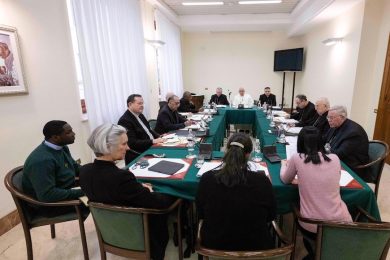In his recently released exhortation, “Amoris Laetitia” (“The Joy of Love”), Pope Francis affirms the family as the foundational unit of society, the place where children are nurtured and formed in love and where spouses grow in self-giving.

“The welfare of the family,” the Holy Father says, “is decisive for the future of the world and that of the Church.”
Later in the document, the Pope tells us that “families have the right to be able to count on an adequate family policy on the part of public authorities in the juridical, economic, social and fiscal domains.”
Pope Francis is reminding us that “family policy” expands far beyond any limited set of issues. Instead, “family policy” should be a description of all good public policy. In other words, all laws and policies ought to contribute to — or at least not prohibit — the conditions that allow family life to flourish.
Family policy in Minnesota
That the well-being of the natural family should be the focus of all social policy is a truth that animates the Minnesota Catholic Conference’s advocacy work at the Capitol. Below are some selections from Pope Francis’ exhortation with clear policy implications, and related actions we’re taking to promote the conditions needed for family flourishing here in Minnesota.
 Parental choice in education“Parents themselves enjoy the right to choose freely the kind of education — accessible and of good quality — which they wish to give their children in accordance with their convictions” (84).Pope Francis reminds us that parents are the “primary educators” of their children. In order to expand the rights of parental choice in education to low-income households throughout Minnesota, legislators should add tuition as an eligible expense to the K-12 education income tax credit.
Parental choice in education“Parents themselves enjoy the right to choose freely the kind of education — accessible and of good quality — which they wish to give their children in accordance with their convictions” (84).Pope Francis reminds us that parents are the “primary educators” of their children. In order to expand the rights of parental choice in education to low-income households throughout Minnesota, legislators should add tuition as an eligible expense to the K-12 education income tax credit.- Surrogacy“We cannot overlook the use of surrogate mothers and the exploitation and commercialization of the female body in the current media culture” (54).Every child has the right to be conceived, carried in the womb, brought into the world and brought up within marriage. Surrogacy arrangements sever these crucial bonds, while also exploiting women and commodifying human life.
MCC is asking legislators to create a legislative study commission to conduct a bipartisan, fact-finding analysis of the surrogacy industry to make sure our state is protecting the well-being of vulnerable women and children in Minnesota. (See the Action Alert to learn how you can help us with this effort!)
- Assistance to low-income working families“The problems faced by poor households are often all the more trying” (49).Pope Francis tells us that poverty takes “its toll on the serenity of family life.”
This is why MCC is advocating for a $100 increase in the monthly cash assistance given to low-income working families through the Minnesota Family Investment Program (MFIP); this rate hasn’t been raised in 30 years, despite significant increases in inflation and the cost of living.
- Physician-assisted suicide“The family protects human life in all its stages, including its last. … Similarly, the church … feels the urgency to assert the right to a natural death, without aggressive treatment and euthanasia” (83).A proposal to legalize physician-assisted suicide in Minnesota was successfully blocked earlier this year, but it will return again next year. We’re continuing to spread the word that this practice could endanger the elderly, undermines the dignity of persons with disabilities and has no place in a state with world-class healthcare.
- Immigration“[The dedication and concern shown to migrants serves] as a test of our commitment to show mercy in welcoming others and to help the vulnerable to be fully a part of our communities” (47).The stability of families and the well-being of children need to be central concerns of immigration policy.
This is why MCC continues to call for federal immigration reform, supports the federal deferred action programs (DAPA and DACA) to keep immigrant families together, and also advocates for the creation of a provisional driver’s license to allow undocumented people living in Minnesota better access to work, church and school — all things essential for family flourishing.
Liedl is communications manager at the Minnesota Catholic Conference, the public policy voice of the church in Minnesota. To learn more about the implications of “The Joy of Love” for public policy and how you can support MCC’s family-focused endeavors in Minnesota, visit MNCatholic.org.






















